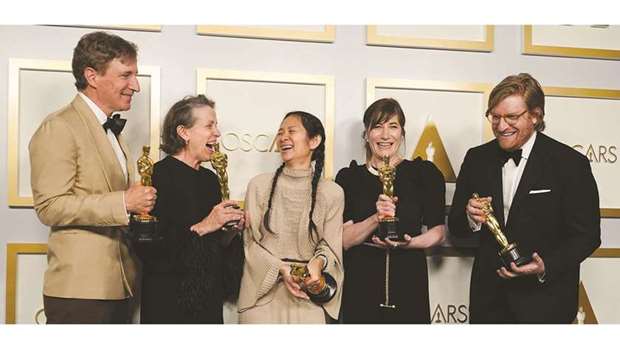Nomadland, the story of van dwellers in America, won the best picture Oscar and two other Academy Awards on a triumphant night for women that also saw a return to Hollywood glamour after a long pandemic shutdown.
In a major upset, Britain’s Anthony Hopkins won the best actor trophy for his role as a man battling dementia in The Father.
The Oscar had been widely expected to go to the late Chadwick Boseman for his final film, Ma Rainey’s Black Bottom.
Hopkins paid tribute to Boseman in a message thanking the Academy of Motion Picture Arts and Sciences.
Speaking from his native Wales, Hopkins said in a video message posted on Instagram that the award, the second Oscar of his career, was unexpected.
“Good morning, here I am in my homeland in Wales,” Hopkins said. “At 83 years of age, I did not expect to get this award, I really didn’t. Thank you all very much.”
“I want to pay tribute to Chadwick Boseman, who was taken from us far too early.”
Black Panther star Boseman died last year aged 43 after a four-year battle with colon cancer.
China native Chloe Zhao was named best director for Searchlight Pictures’ Nomadland, making her the first Asian woman and only the second woman ever to take home the trophy.
Kathryn Bigelow was the first in 2010.
Zhao thanked the nomadic community for “teaching us the power of resilience and hope and reminding us what true kindness looks like”.
Frances McDormand, one of the few professionals in the film in which several people played versions of themselves, won her third Oscar.
Social distancing forced a rethink of the ceremony, moving it to Union Station in downtown Los Angeles.
After strict coronavirus (Covid-19) testing and quarantine protocols, nominees and their guests walked the red carpet, mostly maskless.
They sat in a cabaret-style room inside the Mission Revival-style rail station or chatted in an outdoor courtyard.
The prospect of all four acting honours going to people of colour for the first time was not realised.
However, 15 women won a record 17 Oscars, the Film Academy said, including for sound (Sound of Metal), production design (Mank), original screenplay (Promising Young Woman) and documentary feature (My Octopus Teacher).
The national reckoning about systemic racism in the United States was also a theme following the murder conviction last week of a white police officer who knelt on the neck of black man George Floyd.
“As a mother of a black son, I know the fear that so many live with, and no amount of fame or fortune changes that,” said Regina King, who directed One Night in Miami, about four black icons at the height of the 1960s civil rights movement.
Youn Yuh-jung, 73, won the best supporting actress Oscar for her role as a cantankerous grandmother in immigrant tale Minari.
Youn, the first South Korean actor or actress to win an Oscar, joked about people mispronouncing her name.
“Tonight you are all forgiven,” she said. “Me being here, I cannot believe it.”
The ceremony for the highest honours in the movie business took place after a turbulent year for the industry that shuttered production and movie theatres for months and saw studios delay the release of some blockbusters by more than a year.
“This was indeed a hard year for everyone, but our love for movies helped to get us through it,” said presenter King, opening the ceremony, which had no host for the third straight year.
McDormand made a passionate plea for people to return to theatres.
“One day, very soon, take everyone you know into a theatre, shoulder to shoulder in that dark space, and watch every film that’s represented here,” she said.
Britain’s Daniel Kaluuya was named best supporting actor for his role as 1960s Black Panther activist Fred Hampton in Judas and the Black Messiah.
Meanwhile, the movie Soul, the first from Disney’s Pixar to feature a black lead character, won best animated feature, while Denmark’s Another Round took the prize for best international feature.
The winners were chosen in a secret ballot by the 9,000 members of the Academy of Motion Picture Arts and Sciences.
Preliminary data released yesterday showed that the television audience for the Academy Awards dropped to a record low of 9.85mn viewers on Walt Disney Co’s ABC.
That represented a 58% decline from last year’s final tally, which showed 23.6mn people tuned in.
The slide in viewership reflects a trend among live awards shows.
TV audiences for September’s Emmys and the Grammy Awards in March also drew their lowest audiences ever.
Ratings for the Golden Globes in February fell 60% from a year earlier.
Meanwhile, there was some controversy in China around Zhao’s Oscar success.
All recent posts containing her name and Nomadland were mysteriously wiped from the Twitter-like site Weibo by noon yesterday, Beijing time.
Her win was also met with silence by Chinese media.
Initially hailed by state media for her film’s success at the Golden Globes in March, Zhao became the target of a nationalist backlash after social media users dug up years-old interviews in which she appeared to criticise her country of birth.
Chinese cinemas abruptly pulled the film’s scheduled release.
This year’s Oscars were also not aired on Chinese television or streaming channels.

A picture of Anthony Hopkins, who won Best Actor but did not attend the Academy Awards in person, is shown during an Oscars watch party at the Stuart & Cinema Cafe, in Brooklyn, New York.

People attend the Sunset Strip late night drive-in ‘Oscars Watch Party’ on the parking lot of the Andaz Hotel, West Hollywood, California.

Left: Brad Pitt poses with Yuh-Jung Youn, winner of the award for Best Actress in a Supporting Role for Minari, at the 93rd Academy Awards in Los Angeles.

Daniel Kaluuya, winner of the Award for Best Actor in a Supporting Role for Judas and the Black Messiah.

